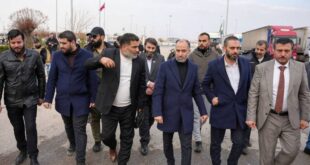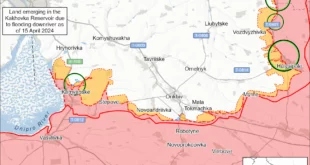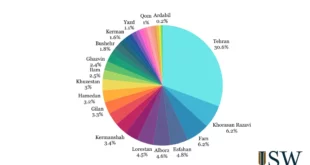The question therefore naturally arises of why so many people, especially in the non-mainstream media community, were misled about those two’s geostrategic calculations. The answer can arguably be found by paying attention to the powerful influence wielded by Armenia’s ultra-nationalist diaspora lobby, the most pernicious elements of which are based in France and the US, but some also reside in Lebanon too.
One of the most successful disinformation narratives about the South Caucasus is that Russia and Iran allegedly fear the Zangezur Corridor, which is another name for the planned regional transport corridor connecting Azerbaijan and Turkiye via Armenia. Those who’ve fallen for this false claim wrongly think that this project is a “Trojan Horse” for undercutting those two’s influence, but official Russian and Iranian statements show that they both actually support this initiative.
Kremlin spokesman Dmitry Peskov said late last week that “There are plans to develop transport communications and logistics in the region. This is extremely important for Azerbaijan, Armenia, and Russia. We hope that this work will continue.” This stance aligns with the Moscow-mediated November 2020 ceasefire, the last part of which stipulates that Armenia must unblock all regional transport links. It also has to open up a Russian-guarded corridor from Azerbaijan to Nakhchivan (and then Turkiye).
Shortly afterwards, a member of the Iranian Parliament’s National Security and Foreign Policy Committee revealed that there are plans to run this route through their country in the event that Armenia remains obstinate. Ali Alizadeh said that “It was Tehran’s idea to connect the two regions in Azerbaijan’s territory via a road in Iran.” He described this option as a so-called “Plan B” and claimed that Iran prefers it to the original plan since Tehran is concerned that the latter could lead to war.
Up until this point, most of the non-mainstream media community thought that streamlining Azeri-Turkish economic connectivity would accelerate the trend of “Pan-Turkism”, which they were convinced is a latent but nevertheless extremely serious geostrategic threat to Russia and Iran’s shared interests. This impression ignored the fact that Azerbaijan and Turkiye are already connected via Georgia, not to mention that Turkiye currently trades with Russia and Iran’s shared Chinese partner via this route.
Nevertheless, it was explained here prior to the latest – and likely last – round of the Karabakh Conflict that “Russia & Iran Are On The Same Page Regarding Armenia”. Peskov and Alizadeh’s subsequent statements about their respective country’s support for the Zangezur Corridor confirm the aforesaid analysis. The question therefore naturally arises of why so many people, especially in the non-mainstream media community, were misled about those two’s geostrategic calculations.
The answer can arguably be found by paying attention to the powerful influence wielded by Armenia’s ultra-nationalist diaspora lobby, the most pernicious elements of which are based in France and the US, but some also reside in Lebanon too. They masterfully infiltrated the non-mainstream media community over the past decade by raising awareness of the threat to Syria’s Christian community, particularly their fellow co-ethnics there, throughout the course of its over decade-long hybrid civil-international conflict.
They were driven to do so out of solidarity with their diaspora, but their fact-based information campaigns aligned with Russian and Iranian interests in Syria, both of which sought to expose how many Western-backed fighters there are actually terrorists who want to genocide Christians. Accordingly, these Armenian activists were welcomed into those two’s information ecosystems and embraced by supporters of their anti-Western worldview, even though some of them were actually pro-Western.
In the years since, many genuinely anti-Western activists were misled into thinking that these Armenian activists shared their worldview due to their outspoken criticism of Western policy in Syria, during which time these activists exploited their newfound fame to maximally push their ethno-centric agenda. In the context of the present analysis, this took the form of manipulating perceptions about the Karabakh Conflict to frame Azerbaijan and Turkiye as allegedly posing a threat to Russia and Iran.
This disinformation campaign aimed to mislead influential members of those two’s media ecosystems, both formal ones such as their publicly financed international flagships as well as those independent outlets that largely support Russia and Iran’s anti-Western worldviews. These activists hoped that those two states’ policymaking communities would then be influenced by the newly reshaped views of their respective media ecosystems towards the Karabakh Conflict, Azerbaijan, and Turkiye.
The end goal of these Syrian-focused Armenian diaspora activists and their “fellow travelers”, meaning those non-Armenian Syrian-focused activists whose views towards the preceding three subjects were influenced by these efforts over the decade, was to turn Russia and Iran against Azerbaijan and Turkiye. This long-term influence campaign failed as proven by the latest conflict and was exposed in hindsight after these same “anti-Western activists” united to aggressively push false Western narratives about it.
To be clear, one’s support of Armenian separatism isn’t indicative of them functioning as that diaspora’s “agent of influence” or even just their “useful idiot”. Their earlier concerns about potential “ethnic cleansing” and “genocide” in Karabakh prior to the latest round of violence isn’t a dead-giveaway either. Everyone has the right to their opinion, whatever it may be and for whichever reason(s) they hold it, but nobody has the right to their own facts. Therein lies the problem with these “anti-Western” activists.
Russia has denied that any “ethnic cleansing” or “genocide” is taking place in Karabakh and insists that its peacekeepers there are helping to meet local Armenians’ humanitarian needs. The Armenian diaspora and their Western government allies, however, claim the exact opposite and have exploited these false concerns to push for military intervention. Unsurprisingly, many of the previously described Syrian-focused “anti-Western activists” from the non-mainstream media community parroted their lies.
The following analyses debunk the West’s false narratives on this issue and expose its geopolitical goals:
- “Armenia & Its US-Based Diaspora Lobby Want America To Declare War On Azerbaijan”
- “Justice & Development, Not ‘Genocide’, Will Follow The End Of The Karabakh Conflict”
- “False Claims Of ‘Genocide’ In Karabakh Are The West’s Latest Anti-Russian Dog Whistle”
- “The Artificially Manufactured ‘Ethnic Cleansing’ Of Karabakh Is A Political Ploy By The Diaspora”
- “The Kremlin Pushed Back Against False Claims About The Situation In Karabakh”
Anyone who peddles these lies is therefore laundering the West’s information warfare narratives.
It’s now known for a fact that Russia doesn’t believe that either crime is being committed in Karabakh, and that the Kremlin doesn’t fear Azerbaijan’s Zangezur Corridor either, nor does Iran. These developments decisively discredit the top two claims pushed by the Armenian diaspora lobby’s “agents of influence” and their “useful idiots” in the non-mainstream media community. Furthermore, they also expose the preceding network since no sincere anti-Western activist would keep spewing those lies.
Nobody should be faulted for earlier thinking that Iran was against the Zangezur Corridor prior to Alizadeh’s statement, though there was no reason to think that Russia was since this corridor’s creation is stipulated in the Moscow-mediated November 2020 ceasefire. Even so, those who wrongly held this view might be given the benefit of the doubt. The same can be said about anyone who sincerely worried about “ethnic cleansing” or “genocide” in the event that Azerbaijan ever regained control of the region.
After everything that just unfolded since the latest – and likely last – round of the Karabakh Conflict, however, nobody who claims to be “anti-Western” can honestly hold those opinions any longer. They might still support Armenian separatism, but fearmongering about alleged crimes there together with insisting that Russia and Iran are supposedly against the Zangezur Corridor is bonafide disinformation. The only ones who still do this are the Armenian diaspora’s “agents of influence” and “useful idiots”.
Average members of the non-mainstream media community should be aware of which influential figures are playing such roles in order to avoid being further misled by them. They’ve proven themselves untrustworthy by parroting Western lies about the Karabakh Conflict after becoming famous over the past decade for presenting themselves as supposedly being “anti-Western” activists. Anyone who continues looking to these figures for guidance is setting themselves up to be misled even more.
 Eurasia Press & News
Eurasia Press & News




